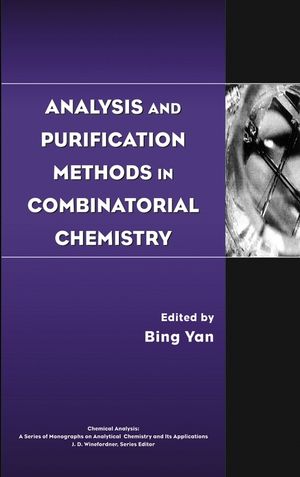Analysis and Purification Methods in Combinatorial ChemistryISBN: 978-0-471-26929-8
Hardcover
480 pages
December 2003
 |
||||||
Quality measurement, control, and improvement in combinatorial
chemistry
Combinatorial chemistry has developed rapidly in the past decade, with great advances made by scientists working on analysis and purification of a large number of compounds and the analysis of polymer-bound compounds. However, formidable challenges lie ahead of today's researcher. For example, high-throughput analysis and purification technologies must be further developed to ensure combinatorial libraries are "purifiable," and "drugable."
To this end, Analysis and Purification Methods in Combinatorial Chemistry describes various analytical techniques and systems for the development, validation, quality control, purification, and physicochemical testing of combinatorial libraries. A new volume in Wiley's Chemical Analysis series, this text has four parts covering:
* Various approaches to monitoring reactions on solid support and optimizing reactions for library synthesis
* High-throughput analytical methods used to analyze the quality of libraries
* High-throughput purification techniques
* Analytical methods applied in post-synthesis and post-purification stages
Drawing from the contributions of respected experts in combinatorial chemistry, this comprehensive book provides coverage of applications of Nuclear Magnetic Resonance (NMR), liquid chromatography/mass spectrometry (LC/MS), Fourier Transform Infrared (FTIR), micellar electrokinetic chromatography (MEKC) technologies, as well as other analytical techniques.
This eminently useful volume is an essential addition to the library of students and researchers studying or working in analytical chemistry, combinatorial chemistry, medicinal chemistry, organic chemistry, biotechnology, biochemistry, or biophysics.
Combinatorial chemistry has developed rapidly in the past decade, with great advances made by scientists working on analysis and purification of a large number of compounds and the analysis of polymer-bound compounds. However, formidable challenges lie ahead of today's researcher. For example, high-throughput analysis and purification technologies must be further developed to ensure combinatorial libraries are "purifiable," and "drugable."
To this end, Analysis and Purification Methods in Combinatorial Chemistry describes various analytical techniques and systems for the development, validation, quality control, purification, and physicochemical testing of combinatorial libraries. A new volume in Wiley's Chemical Analysis series, this text has four parts covering:
* Various approaches to monitoring reactions on solid support and optimizing reactions for library synthesis
* High-throughput analytical methods used to analyze the quality of libraries
* High-throughput purification techniques
* Analytical methods applied in post-synthesis and post-purification stages
Drawing from the contributions of respected experts in combinatorial chemistry, this comprehensive book provides coverage of applications of Nuclear Magnetic Resonance (NMR), liquid chromatography/mass spectrometry (LC/MS), Fourier Transform Infrared (FTIR), micellar electrokinetic chromatography (MEKC) technologies, as well as other analytical techniques.
This eminently useful volume is an essential addition to the library of students and researchers studying or working in analytical chemistry, combinatorial chemistry, medicinal chemistry, organic chemistry, biotechnology, biochemistry, or biophysics.



